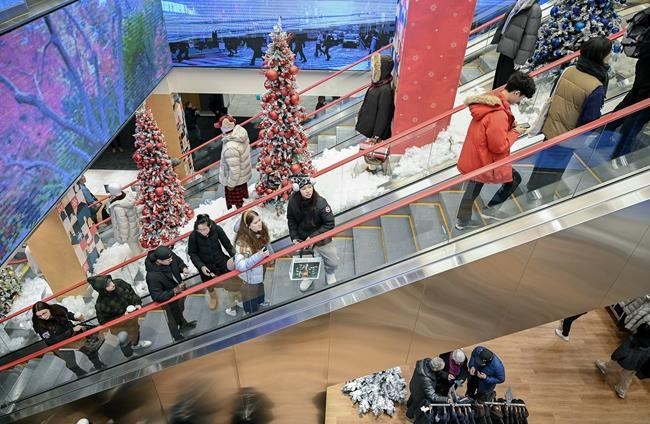MONTREAL — With Christmas and Boxing Day in the rear-view mirror, consumers have one event left this year to mull how much they're willing to spend on: New Year's Eve.
Canadians are thinking twice about indulging in lavish celebrations this Sunday thanks to a wide range of worries, from pocketbook woes to COVID-19 concerns and even angst about armed conflict abroad.
Average household spending during the holidays was slated to fall 11 per cent from last year due to persistent financial pressures, according to a Deloitte Canada study in October, one of several reports to forecast lower consumer expenditures.
"Everything is expensive," said Vivek Astvansh, a marketing professor at McGill University. Canada's consumer price index hit a record high last month, with inflation forecast to continue to climb beyond target levels well into 2024.
Ongoing price hikes will likely convince many to opt for smaller, less expensive private gatherings on Dec. 31, whereas those still inclined toward a bar or restaurant outing might choose a more affordable venue, Astvansh said.
Heightened global tensions and geopolitical upheaval may even be trickling down to consumer psychology and spending choices.
“There is this overall sense of doom and gloom,” Astvansh said, citing the Israel-Hamas war and Russia's nearly two-year invasion of Ukraine. "There’s a bit of unrest and discontent which is curbing people’s enthusiasm in this holiday season and heading into the new year.”
On the flip side, an escapist urge or simply the affirmation of friends and festivity will still propel revellers out on the town — "going outside, dressing up well and getting that sense of celebration, even though there might be despair in the world around them," he added.
In the U.S., holiday sales rose during the shopping season even as Americans wrestled with higher prices in some areas and other financial worries, according to Mastercard SpendingPulse, which tracks all kinds of payments including cash and debit cards.
The totals were more in line with levels typically seen during the holiday season, however, after a surge in spending last year during the same period.
Looking beyond Dec. 31, New Year's resolutions will also work their usual alchemy of turning pledges into profits, spurring personal spending on health, professional development and other areas of self-improvement as Canadians look to start afresh despite continuing cost increases.
"They'll pay for the next six months or one year of visiting fitness centres, having hot yoga sessions or enrolling in a new educational program. These are forward-looking people who will make these investments toward themselves now," Astvansh said.
In November, the country's inflation rate held steady at 3.1 per cent, with higher prices for recreation and clothing in particular, and staples such as food projected to become pricier still.
However, the pace of grocery price increases fell to 4.7 per cent last month from a year earlier, marking a slowdown from 5.4 per cent in October, according to Statistics Canada's latest consumer price index report.
The Canadian economy has struggled to grow this year as higher borrowing costs make it more expensive for businesses to invest and consumers to spend, which may further hamper holiday indulgences and New Year's blowouts.
The unemployment rate has also been on the rise as the job market struggles to keep up with strong population growth, further chipping away at big-spender mindsets.
Meanwhile, the Bank of Canada's highest benchmark interest rate since 2001 promises to gobble up a larger share of disposable income for homeowners and debtors. Up to 2.2 million mortgages are up for renewal in 2024 and 2025, amounting to 45 per cent of all outstanding Canadian mortgages, experts say.
The tougher economic conditions are expected to lay the groundwork for a further deceleration in inflation next year. But in a speech delivered by Bank of Canada governor Tiff Macklem earlier this month, he acknowledged there may be bumps along the way to returning inflation to the central bank's two per cent target.
This report by The Canadian Press was first published Dec. 29, 2023.
— With files from The Associated Press
Christopher Reynolds, The Canadian Press



